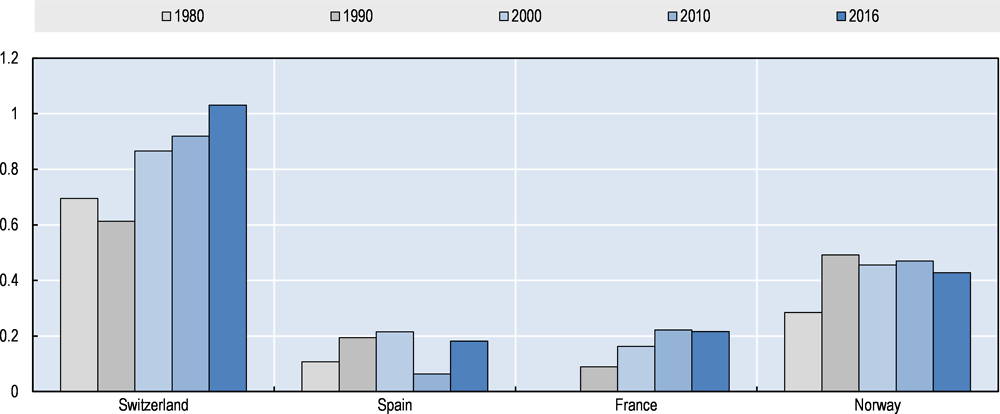(Editor’s note: This is Pt. 2 of a two-part series on everyone’s favorite topic. Taxes. Specifically, taxes in Spain. You can see Pt. 1 here.)
For British expats in Spain, everything has changed and you’re no longer European Union citizens. Which could have a big impact on your tax status if you’re thinking of becoming a permanent resident.
Let’s look at the granular details because not understanding the tax system can cost you money. Lots of money.
Wealth Tax
Spain has a wealth tax* is applied to total worldwide assets valued above 700,000 euros with an additional 300,000 euros allowance/deduction applying to the value of their main residence (Spanish residents only), the rate of tax is variable starting at 0.2 percent increasing to 2.5 percent on accumulated wealth above 11.4 million euros.
So far so good, except that the wealth tax is ceded in full to the Autonomous Communities (the 17 regions that make up Spain) and so you have probably already guessed (because things in Spain are never straightforward) that some of these regions have taken it upon themselves to change things around slightly and tinker with the rates and allowances.
Madrid for instance has one rate tax 0.0 percent (so no wealth tax in Madrid!) whereas other regions amongst them Andalucia and the Balearics have an increased top rate of 3.03 percent and 3.45 percent respectively.
Other regions have played around with the allowances Catalunya have reduced the allowance/exemption to 500,000 euros and increase the rates slightly, Valencia have reduced the exemption to 600,000 euros but they too have increased the rates by over 25 percent.
So, apart from Madrid is there any good news? Sort of ….
There is a 60-percent rule which establishes that your cumulative wealth and income tax liabilities cannot exceed 60 percent of your personal taxable income. This is neither the time nor the place to go into the nitty-gritty about this complicated issue. However, if you have substantial assets, this is something to bear in mind and maybe speak to your financial advisor about.
There are also number of exclusions amongst them domestic household items, pension rights, and certain shareholdings do not attract wealth tax. Your advisor should be able to furnish you with more details.
*(Author’s note: The Wealth Tax was reintroduced in 2011 as an emergency measure but continues to this day with no sign of it being abolished. It is applied to a Spanish residents world-wide assets, in the case of non-residents the tax applies to Spanish assets only.)
Inheritance Tax (IHT) – “impuesto de sucesiones y donaciones”
IHT – Trying to condense IHT into a few short paragraphs is almost a futile exercise not least because the complexities and importance of the subject warrants and deserves an entire article (nay, book) all to itself.
For that reason, I shall only briefly touch upon the subject and come back to it at a later date.
If there is only one thing that you take from this article let it be this – IF you have taken up residency in Spain, get a Spanish Will drawn up. Not doing so and dying intestate can result in a very costly and protracted process that is for want of a better term a real pain in the posterior, though obviously not for the deceased of course they will be long past caring.
Non-resident beneficiaries will be taxed on Spanish based assets only and residents of Spain will be taxed on the full amount of their inheritance. Inheritances must be reported and paid within six months of the date of death. (A one-off extension may be applied for, granted and is subject to interest) which highlights one significant problem what if you have inherited a house, can’t sell it and don’t have the money to pay the tax?
Where IHT gets complicated in Spain is, it is regulated by the Spanish Civil Code meaning it is ceded to the Autonomous Communities or regions and as such is subject to hugely wide-ranging regional variations, with many having their own succession rules, allowances, and rates. For more information regarding the area where you reside you should contact an appropriate advisor.
In order to be subject to regional laws you need to have been habitually resident in that region for five or more years. Where this is not the case, you will be subject to national law.
So, to give you an idea the national rates, which are progressive, start as 7.65 percet on small inheritances up to 7,993 euros rising to 34 percent on amounts over 797,555 euros. Importantly, unlike most countries in Spain there are few exemptions, however I’ll run through the main ones:
• Children of the deceased, including those adopted, who are under 21 years old get an allowance of 47,859 euros.
• Children who are over 21 years old, including the grandchildren of the deceased, his or her parents and grandparents. Finally, the spouse get an allowance of 15,957 euros.
• Siblings, nieces, nephews, aunts, uncles and their descendants and ascendants, as well as in-laws receive a 7,993 euro allowance.
• Individuals with disabilities enjoy an allowance that goes from 47,000 euros to 50,000 euros depending on the degree of their disability.
Finally, if the inheritance corresponds to the main residence of the deceased and the beneficiaries don’t intend to sell it within a five-year period, an additional allowance can be claimed.
Double Taxation Agreement
This brings me to another commonly asked question: “Can I be taxed twice on the same income?”
Thankfully the answer is generally, “No!” A renewed double taxation treaty (based on a 1975 Treaty) was entered into between the UK and Spain on 13 March 2013 and came into effect on 12 June 2014. Notice that the agreement is between the UK and Spain and as such remains unaffected by Brexit. The agreement (which you can read here) covers income, corporate and capital gains taxes.
Without wanting to become bogged down in detail, essentially the DTA means that the same income cannot be taxed twice both in the UK and in Spain. So, for example if you suffer and pay tax in the UK on say a pension, you will still need to declare that income on your Spanish tax return. However, you will receive a credit for the tax that was deduced in the UK.
As an example, if the UK has deducted the equivalent of 100 euros from income (covered by the Double Taxation Agreement) but in Spain you are liable to 110 euros in tax (on that income) then you will pay an additional 10 euros to the Spanish Authorities.
Of course, there are exceptions and interestingly IHT, which I have just mentioned, is one of the few anomalies when it comes to the DTA. Why? Because it is the beneficiaries in Spain that are taxable, whereas in the UK it is the estate of the deceased person.
And therein lies the problem: the DTA stops the same person being taxed twice on the same income. But, of course, in the case of IHT, different people are taxed on the same income. You can in this case petition the Spanish authorities to offset the amount. However, it isn’t automatic and not always awarded.
Rounding off, I have attached a link of the various tax rates and where possible I’ve included the regional variations.
If you require any further information you can contact me direct or via our Spanish Facebook group – “Moving To And Living in Spain.”
Alternatively if it is professional advice you need then you could do a lot worse than Fran at A/F Consulting, who has many years of tax experience and is an English speaker to boot.

About the author:
Irina Greensitt is from the far eastern town of Khabarovsk in Russia, but lived in the United Kingdom for seven years before moving to Spain in 2014 with her husband and two young children.
Irina now runs an internet business and lists walking, travel and sailing (passing her skippers exam in 2016) amongst her hobbies.
See all of Irina’s posts here.
See more from Dispatches’ Spanish archive here.














